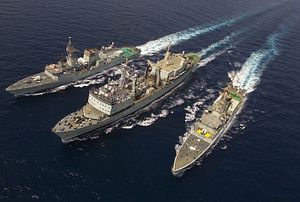Today I was the Knight Who Says Ni Conference.
The Naval Diplomat took part in a conference! A conference in a fair city where people appeared to be having a good time!!! (Click here to sample the Monty Python-esque flavor of official policy toward conferences.)
These are sad times when passing ruffians can say conference within earshot of meek U.S. government officials. But fear not, brave folk: no taxpayer dollars went to fund the iniquities of international-relations scholars. Nor did I enjoy myself.
On to serious matters. I chaired a panel on International Cooperation composed of a trio of bright Ph.D. candidates from places like Oxford and Toronto. Good stuff. Later I presented a paper titled “The Death and Life of Surface Fleets,” basically an amalgam of arguments familiar to Naval Diplomat readers (see here and here for a recap). Underlying the nuts-and-bolts of naval development and strategy, though, is a fundamental question: does China accept the U.S.-led order of liberal trade and commerce, or would it prefer to see that system abridged or overthrown?
This is one of those times when real-world affairs draw close to international-relations theory – specifically “public-goods” theory. The concept is simple: if a strong power supplies public goods like maritime security, which benefit all seafaring states, then those states should accept – or at least refrain from trying to scuttle – the leading state’s rule of the waves. Makes sense, doesn’t it? If someone else insists on guaranteeing your security out of its own resources, why argue?
This is not a new idea, although the highfalutin’ political-science label is. One historical case strategists commonly reach for is diplomat Eyre Crowe’s famous 1907 memorandum explaining why rival powers and third parties reconciled themselves to British maritime supremacy. They might not like Pax Britannica, opined Crowe, but Great Britain was the least objectionable of any potential nautical hegemon. The Royal Navy earned legitimacy by policing the sea lanes in the common interest. Provide public goods, ameliorate suspicions.
Does Crowe’s logic still apply today, and if so, does it apply to the Western Pacific, the theater where American sea power may encounter its stiffest challenge? Will China subscribe to public-goods logic? Those who invoke the Crowe Memorandum, myself included, tend to see the answer as self-evident: Yes! Or at least it ought to.
Upon further review, however, I’m not so sure. If Beijing reads its World War I history – and it does – it will remember that Britain withdrew its stewardship of the seas following the outbreak of war. The oceans became another battleground between the Allied and Central powers, with each side doing its best to choke off the other’s seaborne trade. America would scarcely safeguard Chinese merchantmen should some an Asian dispute – Taiwan, the Senkakus, whatever – bring on a shooting war in the Western Pacific. Just the opposite. And indeed, Western strategists have taken to debating the merits of a distant blockade of Chinese commercial shipping.
That’s the nub of it for Beijing, isn’t it? Eyre Crowe’s elegant theory would come as cold comfort to Chinese strategists mindful that the United States could turn its mastery of the seas against China almost instantly. Public-goods theory, then, will do little to assuage worst-case thinking within the Chinese strategic community. Let’s not assume that academic theories will implement themselves in real life – however much sense they make to scholars attending academic conferences.
Now, off to listen to punk-rock music and badmouth my country….

































